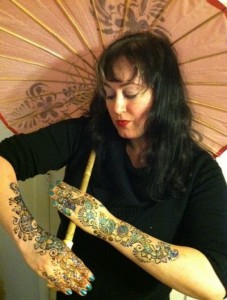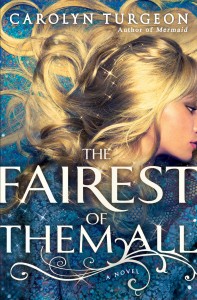Writers on Craft is a new monthly interview series that concerns itself with querying a diverse population of published authors to speak to their perceptions about the nature of craft—and their view on the significance of literature, particularly those who’ve been in the practice of writing for quite some time and actively engaged in the community of American arts and letters. To show the variance in response between authors in different genres and fields of creative writing, six questions will be standard, with one “black box” question that differs for each interview. Writers on Craft is hosted by Heather Fowler.
We are pleased to welcome bestselling author Carolyn Turgeon to the Fictionaut blog today for our first installment and thank her for joining us.

Carolyn Turgeon has published four novels, three for adults – Rain Village (2006), Godmother: The Secret Cinderella Story(2009), Mermaid (2011) — and one for middle-schoolers, The Next Full Moon (2012). Her next novel, The Fairest of Them All, will be out in August 2013 from Touchstone/Simon & Schuster. She is also a faculty member at the University of Alaska at Anchorage’s Low-Residency MFA Program and teaches private writing workshops in State College, PA, in addition to hosting her profound and illuminating I Am A Mermaid blog.
What do you read when you despair at the state of either your work or modern literature–any “go to” texts?
I don’t really despair about literature. I feel that there’s beautiful stuff being produced all the time, an overabundance of it in fact. But the state of modern publishing is another matter. There is so much anxiety already surrounding publishing books and worrying about their reception and what the sales will be, and then there is always some new bit of dire news about copyright laws or ebooks or your own publisher in a battle with the largest bookstore in the country (my next book comes out in August from Simon & Schuster, currently in a dispute with Barnes & Noble)… I can definitely get caught up in that anxiety and have to remind myself why I do all this in the first place, why I write these books and work so hard to get them where I want them to be and put all that effort into trying to promote them. I have to remind myself that I love books and stories, an image or a captured emotion or a turn of phrase that makes me lose my breath. I love them.
My favorite, favorite writings, the ones I can count on to ground me and remind me of why I love literature so much, are these, most of them writings I fell in love with as a teenager: One Hundred Years of Solitude by Gabriel Garcia Marquez, the story “The Distance of the Moon” by Italo Calvino, The Stories of Eva Luna by Isabel Allende, “La Lupa” by Giovanni Verga, Oscar Wilde’s fairy tales, all poetry by Lorca, Boccaccio’s The Decameron, T.S. Eliot’s “The Love Song of J. Alfred Prufrock,” Poe’s “Annabel Lee,” and then the stuff I studied in graduate school, medieval Italian poetry and Victorian poetry, all that swoony Tennyson and Robert Browning and Dante Rossetti. And I love love love myths and fairy tales. Of course.
If you could give just one piece of advice to emerging authors about editing that has served you well, what would it be?
If it’s about editing specifically, I would say this: to really revise, you’ll have to take that complete, shimmering first draft that you spent so much time assembling and you’ll have to rip it apart, and it will hurt. You have to detach and be merciless—cut lines or scenes or whole chapters that don’t work, even if you love them, even if you spent countless hours putting them together, and let the book just fall apart and be horrible. And then you put it back together again, cleaner and sleeker and doing exactly what it’s supposed to do.
What’s hard is that you have to be raw and open and soft to write, and then just blade-sharp and murderous to edit.

How has your perception of what you “do” with your work changed as you have continued to write?
I’m not sure. I just want to keep writing books that are, to me, beautiful, that transport readers to another time and place and sensibility. I’ve had to work hard at plot and structure, though, in telling a story with plenty of twists and turns that maintains suspense throughout and ends up somewhere satisfying. When I started, I could focus on one page to the next, but I got dizzy and completely disoriented when trying to see the big picture. As I write more and more books, I feel more confident about my ability to plot a book and see it from beginning to end, and so I feel like I can experiment more, try new things. I would love to write a screenplay, a play, a graphic novel…. everything!
What do you feel is the purpose of literature?
I think we’re trapped in our bodies, our lives, our own narratives and particular sets of circumstances and that we’re always longing to transcend them and connect with something larger. Story is the best way I know to become completely immersed in another person’s consciousness, to escape the self and expand into the world at large. And to experience, just for a moment, what it is to be completely alien from what we are. When it comes down to it, I think most of our impulses can be traced back to this longing for transcendence.
As a human being, what is the best advice you have to offer?
I think some of the best general this-is-how-you-should-live advice I’ve heard is from the Malcolm Middleton song “Loneliness Shines”:
I think I’ve cracked it, we are what we do
We’re made up of actions, there are no rules
Don’t stand on heads to get higher
Listen to your angels, spread through life like a fire
But if I have to give my own answer, it’s this: to remember that you will die, that you might die today, that everything is fleeting, that you will love people and lose them, that you can’t take anything for granted—not anything at all—and then live accordingly, with all the passion and compassion and bravery and forgiveness and love and humility and appreciation that such a dire set of circumstances demands!
Also: get enough sleep and drink a lot of water. And don’t be an asshole.
As a teacher of creative writing, do you think the enthusiasm of students toward the craft and your direct interaction with their work informs your sense of the marvelous overabundance of wonderful work available now, or soon to be? And do you write while you are teaching or keep those windows separate?
I teach in the University of Alaska at Anchorage’s Low-Residency MFA program, so I’m not a full-time teacher, really. I spend two weeks every July in Anchorage participating in the annual residency, and there I give a couple of talks, give a reading, lead a few workshops and meet with students, who are learning about each faculty member and deciding whom they’d like to work with during the upcoming year—and I spend the rest of that time listening to all the other talks and readings. Which is great. I sit there taking notes and being inspired and I can’t believe I’m getting paid to do it, and I’m forever grateful to novelist Jo-Ann Mapson for bringing me into the program. Those two weeks always put me in touch again with the fact that I really love writing and story and make me feel lucky that I get to do this, whereas generally there is so much anxiety and drudgery wrapped up in it that I can forget that. And of course a large part of that is the students, with all their excitement and passion, their endless ideas, and the faculty, too, which is so diverse. I mean there’s Jo-Ann, who writes her wise, rich, slipping-into-a-hot-bath novels, there’s the poet Anne Caston, who is so sweet and funny and then rips your heart out with her devastating, beautiful poetry, there’s Craig Childs who’s always traipsing around the world thinking about ancient civilizations and earthly mysteries. And plenty more. It’s just inspiring to be around all of that energy, all at once.
The rest of the year, I correspond with a few students who have me as their mentor, and they send stories or novel excerpts according to an agreed-upon schedule and I give them feedback. That’s easy, I’ve been doing the same thing for years with my writer friends, I’m used to always having a little stack of writing to read and give feedback on, and I think that’s important, those ways we help and nurture each other. Plus it forces me to think critically about writing in ways I might not do just on my own. So that, to me, is just part of the writing life, only with these students—who are out there struggling to put their visions down on paper, just like the rest of us—I happen to get paid for it.
What’s recently released or in the pipeline for your readers? Give us a sneak peek.
Well my fifth novel, The Fairest of Them All, comes out on August 6 from Touchstone/Simon & Schuster. It’s about Rapunzel growing up to be Snow White’s stepmother, complete with magic mirrors and heart-eating. I’ve written other fairy tales but this is the first time I’ve combined two of them. It makes perfect sense, though: Rapunzel’s raised by a witch in the woods so of course is a witch herself, and she’s young and blindingly gorgeous, that’s why the prince loves her, and, really, what is going to happen to her once she has her happy ending and rides off with him? She’s going to get older. Bad things happen when women get older, in fairy tales. For a sneak peek you can read the one-page prologue here: http://carolynturgeon.com/books/the-fairest-of-them-all/excerpt/.
I also just turned in the proposal for my next book, which is the “real” story of Dante’s Beatrice (the historical woman from The Divine Comedy and other poetry, a woman we know next to nothing about). I’ve been wanting to write this book for years, and I feel like I had to write all the other books to write this one now.
Writers on Craft is hosted by Heather Fowler, who cares about writing. She does a lot of it. Visit her profile on Fictionaut or see here for more: www.heatherfowlerwrites.com.
Apr 18th, 2013 at 7:43 pm
I loved your answer on the purpose of literature. This was not only a good interview read for me…but a rich, invigorating experience. Thank you Carolyn for sharing your thoughts and Heather for the terrific questions.